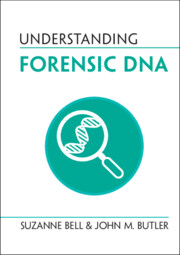Book contents
- Understanding Forensic DNA
- Understanding Life
- Understanding Forensic DNA
- Copyright page
- Reviews
- Dedication
- Contents
- Foreword
- Preface
- Acknowledgments
- 1 Biological Identification
- 2 Before DNA
- 3 First-Generation Forensic DNA
- 4 STR Methods and Loci
- 5 DNA Analysis and Interpretation: Single-Source Samples and Simple Mixtures
- 6 The Curse of Sensitivity
- 7 From Mothers and Fathers
- 8 Emerging Technologies
- 9 Emerging Issues
- Concluding Remarks
- Summary of Common Misunderstandings
- References and Further Reading
- Figure Credits
- Index
4 - STR Methods and Loci
Published online by Cambridge University Press: 02 September 2022
- Understanding Forensic DNA
- Understanding Life
- Understanding Forensic DNA
- Copyright page
- Reviews
- Dedication
- Contents
- Foreword
- Preface
- Acknowledgments
- 1 Biological Identification
- 2 Before DNA
- 3 First-Generation Forensic DNA
- 4 STR Methods and Loci
- 5 DNA Analysis and Interpretation: Single-Source Samples and Simple Mixtures
- 6 The Curse of Sensitivity
- 7 From Mothers and Fathers
- 8 Emerging Technologies
- 9 Emerging Issues
- Concluding Remarks
- Summary of Common Misunderstandings
- References and Further Reading
- Figure Credits
- Index
Summary
In the last chapter, we discussed the first method (RFLP) used in DNA typing. This procedure targeted relatively long DNA fragments (VNTRs) containing many repeated units of a base pair sequence. We ended by noting that they were not amenable to automation and therefore not destined for widespread forensic applications. However, by the early 1990s, many factors coalesced to set the stage for a leap in DNA typing capabilities. For example, the forensic and legal community had adjusted to DNA evidence, and analysts had moved from serological techniques such as ABO to genetic typing utilizing multiple DNA markers. Additionally, researchers in molecular biology, including in genomic sequencing, had identified many shorter repeat sequences that exhibited variation among individuals in a population.
Keywords
- Type
- Chapter
- Information
- Understanding Forensic DNA , pp. 50 - 73Publisher: Cambridge University PressPrint publication year: 2022



